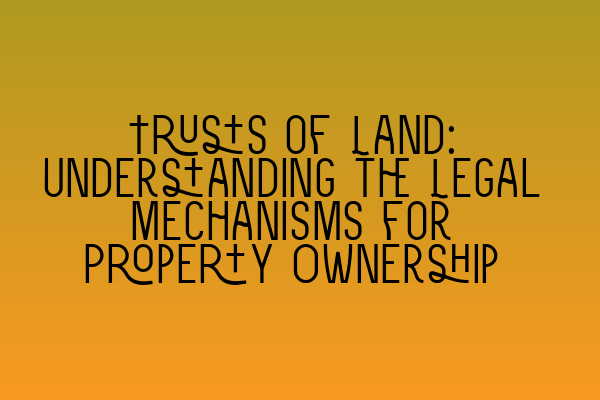Trusts of Land: Understanding the Legal Mechanisms for Property Ownership
As a property law solicitor at SQE Property Law & Land Law, I often encounter clients who are unsure about the legal mechanisms governing property ownership. One such mechanism that frequently comes up in discussions is trusts of land. In this blog post, we will dive deep into the topic, exploring what trusts of land are and how they work.
What Are Trusts of Land?
Trusts of land, also known as trust land arrangements, are legal structures that allow multiple individuals to own and manage property jointly. They are commonly used in situations such as family homes, investment properties, and commercial premises. The purpose of a trust of land is to provide a clear framework for co-ownership and to establish the rights and responsibilities of each person involved.
Understanding Co-Ownership
Co-ownership refers to the situation where two or more individuals hold a legal interest in a property. There are two types of co-ownership: joint tenancy and tenancy in common.
Joint tenancy is the most common form of co-ownership. It means that all co-owners have an equal share in the property, and upon the death of one co-owner, their share automatically passes to the surviving co-owners. Joint tenancy is typically used by married couples or long-term partners.
Tenancy in common, on the other hand, allows each co-owner to own a specific share or percentage in the property. Unlike joint tenancy, there is no right of survivorship, meaning that upon the death of a co-owner, their share will pass according to their will or the rules of intestacy. Tenancy in common is commonly used in investment properties or where co-owners are not related.
The Need for Trusts of Land
While joint tenancy and tenancy in common are suitable for many co-ownership arrangements, they may not always provide the desired level of protection or flexibility. This is where trusts of land come into play. Trusts of land offer a range of benefits, including:
1. Control and management: Trusts allow for the appointment of trustees who can manage and make decisions regarding the property on behalf of the co-owners. This can be particularly useful when there are conflicts or disagreements between co-owners.
2. Protection of interests: Trusts can safeguard the interests of beneficiaries who may have contributed different amounts of money towards the property or have differing financial obligations.
3. Succession planning: Trusts enable co-owners to plan for the future, ensuring smooth transitions upon death or changes in circumstances. This is especially important for family homes or properties held for future generations.
Creating a Trust of Land
Creating a trust of land involves the following steps:
1. Declaration of Trust: A declaration of trust is a legal document that sets out the terms and conditions of the trust. It specifies details such as the names of the co-owners, their respective shares, and the powers and duties of the trustees.
2. Trustees: Trustees are responsible for managing the property and acting in the best interests of the beneficiaries. They have a fiduciary duty to act honestly, in good faith, and in accordance with the terms of the trust.
3. Beneficiaries: Beneficiaries are individuals who have an equitable interest in the property. They are entitled to receive a share of the proceeds from the property’s sale or rental income.
4. Land Registry Requirements: It is crucial to ensure that the trust of land is registered with the Land Registry to protect the interests of the co-owners and beneficiaries.
Seek Legal Advice
Given the complexities and potential legal implications involved in trusts of land, it is essential to seek professional legal advice. A property law solicitor can guide you through the process, ensure compliance with legal requirements, and help you draft and execute the necessary documents.
Trusts of land are a powerful legal mechanism for property ownership that offer protection, flexibility, and orderly succession planning. By understanding the intricacies of trusts of land, you can make informed decisions about your property investments and co-ownership arrangements.
If you want to learn more about other contract law topics, be sure to check out our related articles:
– Ethics in Contract Law: Navigating the Moral and Legal Dimensions
– Misrepresentation in Contracts: Unveiling Deceptive Practices
– A Closer Look at SQE Contract Law Syllabus
– SQE Contract Law: Analyzing Landmark Cases and Influential Judicial Decisions
– Contract Law for Services: Key Considerations and Best Practices
Remember, understanding the legal mechanisms for property ownership can help you protect your interests and make informed decisions. If you have any questions or require legal assistance regarding trusts of land or any other property law matters, do not hesitate to contact us at SQE Property Law & Land Law.
